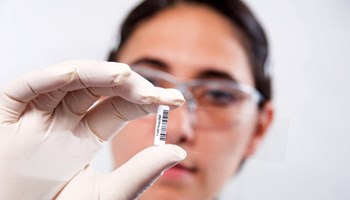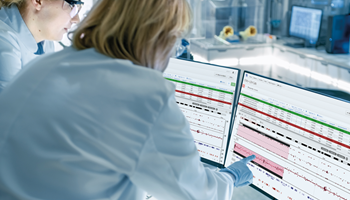Oxford, UK – 05 March 2015. OGT, The Molecular Genetics Company, has teamed up with clinical research experts in a new article available online, discussing the role of next generation sequencing (NGS) in cancer medicine. The article, entitled ‘The role of NGS in stratified cancer medicine’, presents a valuable resource to better understand the present and the future of NGS in stratified cancer medicine, detailing the most relevant aspects of this revolutionary technology.
A key focus of current cancer research is developing the use of stratified medicine. The approach is highly advantageous in guiding effective therapy as it profiles the genetic makeup of individual tumour samples. Revealing insights into why NGS is becoming ever more popular for this very purpose, NHS Clinical Scientists Dr George Burghel and Dr Matthew Smith discuss its primary strengths and the challenges faced, as well as important factors to consider for its application. The role of this rapidly evolving technology in realising stratified cancer medicine depends on many aspects, and this account of how it is currently being applied presents a valuable update for the molecular pathology community on the most effective application of NGS.
The article explains how targeted sequencing panels meet the high-throughput needs and cost considerations for the clinical research laboratory, and how content for such panels is carefully chosen and tested, while also evolving alongside the latest genomic discoveries. Library preparation methods are a key consideration for targeted sequencing, and readers can also discover the pros and cons of amplicon and hybridisation techniques, based on first-hand experience.
As Dr Burghel and Dr Smith also explain, in addition to enhancing the technology itself, it is important to consider logistical aspects of integrating NGS in the clinical research setting, which demands stringent quality control and compatibility with FFPE samples.
“The introduction of high-throughput NGS methods is revolutionising cancer genomics research, which is rapidly moving from single-gene mutation analysis to cancer genomic profiling,” comments Dr Burghel on the current utility of NGS. Based on its present success, the future of NGS is sure to prove a key driver of stratified medicine, as Dr Smith supports: “Along with existing and emerging testing strategies, NGS has an extremely important role to play in future cancer characterisation and treatment.”
About OGT
OGT, a Sysmex Group company, is a leading global provider of clinical and diagnostic genomic solutions that are created for scientists by scientists - including CytoCell®, CytoSure® and SureSeq™ ranges of FISH, microarray and NGS products. The company is dedicated to creating products that enable researchers and clinical decision makers to reach the right care decisions for each patient, every time. OGT strives to unlock the future of genetic clinical care with a commitment to working in partnership with its customers - not only by sharing its expertise of 25 years at the forefront of genetic endeavour, but also by working closely with scientists to understand their unique challenges, and to customise its approach to meet their exact needs. Dedicated to improving clinical care, OGT believes that through partnership—together—we’ll achieve more.
For more information on the Company, please visit our website at ogt.com
CytoSure®, SureSeq™ and myProbes®: For Research Use Only, not for use in diagnostic procedures. CytoCell: Some products may not be available in your region.
About Sysmex Corporation
Sysmex Corporation is a world leader in clinical laboratory systemization and solutions, including laboratory diagnostics, laboratory automation and clinical information systems. Serving customers for more than 50 years, Sysmex focuses on technological leadership in diagnostic science and information tools that make a difference in the health of people worldwide. The company is also exploring emerging opportunities in the life science field. Its R&D efforts focus on the development of high-value-added testing and diagnostic technologies that are innovative, original and optimize individual health. Sysmex also seeks to leverage its state-of-the-art technologies for cell, gene and protein analysis. The company, headquartered in Kobe, Japan, has subsidiaries in North America, Latin America, Europe, the Middle East, Africa, China and Asia Pacific and employs more than 9,000 employees worldwide. Sysmex Corporation is listed in the top tier of the Tokyo Stock Exchange.
For more information about Sysmex Corporation and its affiliate companies, please visit www.sysmex.co.jp/en/.

Launch of two NGS panels enables comprehensive detection of genetic abnormalities involved in breast and ovarian cancer, and myeloid disorders.
Read
New content and Interpret NGS analysis software detection capabilities include BCR-ABL and KMT2A-PTD detection.
Read
Robust panel enables accurate and comprehensive constitutional genetic aberration screening in one assay.
Read